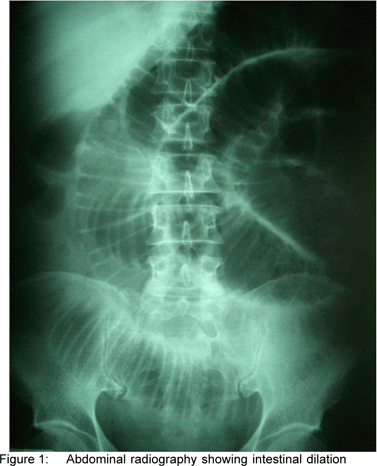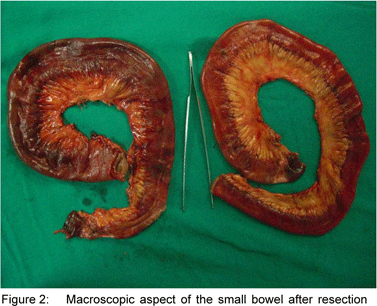|
|
|
|
 |
 |
| |
 |
|
|
Case Report |
|
|
|
|
|
Keywords :
|
|
|
Augusto Cesar Silva Santana, Andre Luiz Santos Rodrigues*, Lucas Crociati Meguins, Para. Belem, Para, Brazil
Department of General Surgery
Dom Luiz I Hospital of Beneficente
Portuguesa do Pará. Belém
Pará, Brazil.
Corresponding Author:
Dr. André Luiz Santos Rodrigues
Email: santosrodrigues@superig.com.br
DOI:
http://dx.doi.org/
48uep6bbphidvals|281 48uep6bbphidcol4|ID 48uep6bbph|2000F98CTab_Articles|Fulltext Acute mesenteric ischemia (AMI) is a potentially fatal vascular emergency that requires early diagnosis and treatment to adequately restore mesenteric blood flow and to prevent bowel necrosis and patient death.[1,2] Although AMI accounts for only about 1%-2% of all gastrointestinal illnesses, it has an overall mortality rate of 60%-80%.[2,3,4] AMI results from impaired blood flow within the mesenteric arterial or venous systems and is most often caused by thrombotic or embolic disease.[5] However, there are a few instances of acute occlusive events or low flow states of the mesenteric vasculature resulting as complications of colonoscopy.[6,7,8,9,10]
This report narrates a case of AMI following colonoscopy in a Brazilian male patient.
Case Report
A 62-year-old man from the Brazilian Amazon region, with no remarkable past medical history, was admitted with a 15-day history of nausea, vomiting and moderate abdominal pain associated with mild rectal bleeding of bright red blood. He was pale and dehydrated. His hemogram depicted microcytichypochromic anaemia (red blood cells: 3.28 x106/mm3; hemoglobin: 8.1 g/dL; hematocrit: 35.1%; mean corpuscular volume: 72 fL; mean corpuscular hemoglobin: 26.3 pg; mean corpuscular hemoglobin concentration: 30.8 g/dL). The electrolyte balance was normal. Upper gastrointestinal endoscopy revealed mild antral gastritis. As no structural abnormality that might explain rectal bleeding was identified, the patient was prepared for colonoscopy with routine preparation consisting of 750 mL of 20% mannitol solution administered orally. Colonoscopy demonstrated the presence of diverticula in the sigmoid colon and peridiverticular red spots. The patient was managed symptomatically. Twelve hours later, he reported worsening of the abdominal pain, and tenderness and distension were noted. Abdominal radiography revealed significant intestinal dilation (Figure 1). Despite all clinical support with intravenous fluids, broad-spectrum antibiotics and nasogastric tube decompression, the patient’s clinical course worsened, and he developed sepsis. Exploratory laparotomy was performed and revealed small bowel dilation and diffuse mild mesenteric ischemia with intestinal peristalsis. There was no evidence of intestinal obstruction at surgery. Loop ileostomy was performed to assess the viability of the small bowel in the post-operative period and to avoid intestinal resection. The patient’s condition did not improve with medical treatment and on the second post-operative day he developed fever, abdominal tenderness and dilation. Clinical assessment of the ileostomy revealed stomal necrosis and urgent exploratory laparotomy was indicated. During surgery, ischemic necrosis was seen in approximately 40 cm of the distal ileum, which was then resected (Figure 2). End ileostomy was carried out after intestinal resection. The patient had an uneventful recovery and was discharged on the fourteenth postoperative day. Endto- end ileo-colic anastomosis was performed to reconstruct the intestinal tract three months later. Histopathology of the small bowel demonstrated transmural ischemic necrosis with hemorrhage and non-occluded mesenteric artery.


Discussion
Acute mesenteric ischemia (AMI) is a challenging clinical and surgical problem with diverse causes, which often results in delayed diagnosis and treatment. It was first described by Antonio Beniviene in the 15th century and later by Virchow in the 19th century.[11] AMI is a clinical syndrome characterised by inadequate blood flow through the mesenteric circulation resulting in ischemia and eventual gangrene of the bowel wall.[1,2,3,4,5] Although AMI accounts for only about 1%-2% of all gastrointestinal illnesses, it has an overall mortality of 60%- 80%.[2,3,4] The underlying process of AMI can involve emboli, arterial or venous thrombosis, vasoconstriction from low flow states or vasculitis, and the most common predisposing conditions are mural thrombi due to cardiac hypokinesia or atrial fibrillation, cardiac valvular lesions, septic shock and systemic hypotension.[1,2,3,4,5] However, there is little evidence describing acute occlusive events or low flow states of the mesenteric vasculature as a complication of colonoscopy.[6,7,8,9,10]
Possible predisposing conditions observed in patients that developed mesenteric ischemia after colonoscopy include connective tissue disease, advanced age, cardiovascular disease and immunosupression.[9,10] According to Rice et al,[9] decreased intravascular volume resulting from fasting and colon preparation, further reduction of vascular tone through medications used for conscious sedation and the mechanical effects of colonoscopy may work together to create a low flow state precipitating acute mesenteric ischemia. In this report, physical examination of the patient revealed pallor and dehydration before colonoscopy that may have contributed to the AMI.
The occurrence of signs and symptoms suggestive of acute mesenteric ischemia shortly after colonoscopy indicates a casual relationship. The main indications for colonoscopy in these patients were diarrhoea, colon cancer surveillance, rectal bleeding, anorexia and weight loss.[6,7,8,9,10] The onset of signs and symptoms varied from two hours to three days.[6,7,8,9,10] In our case, the patient was referred for colonoscopy due to unexplained rectal bleeding and presented with initial signs of mesenteric ischemia twelve hours later.
The ideal management protocol of patients with acute mesenteric ischemia has not yet been defined. Supportive therapy was initiated by Wheeldon et al,[6] McGovern et al,[7] and Nozawa et al,[10] and one patient died. On the other hand, Church[8] and Rice et al[9] managed their patients surgically with loop sigmoidostomy and thrombectomy, respectively, with one resulting fatal case. In this case, exploratory laparotomy and loop ileostomy were performed to assess the viability of the small bowel with the intention to preserve the small intestine. However, the patient developed intestinal ischemic necrosis and, in a second operation, nonviable bowel segments were resected and end-ileostomy was performed. He had a satisfactory recovery and was discharged on the fourteenth post-operative day.
In conclusion, this case reinforces the importance of increased awareness of AMI as a potential complication of colonoscopy which may lead to early diagnosis, treatment and improved outcome.
References
1. Berland T, Oldenburg WA. Acute mesenteric ischemia. Curr Gastroenterol Rep. 2008;10:341–6.
2. Yasuhara H. Acute mesenteric ischemia: the challenge of gastroenterology. Surg Today. 2005;35:185–95.
3. Oldenburg WA, Lau LL, Rodenberg TJ, Edmonds HJ, Burger CD. Acute mesenteric ischemia: a clinical review. Arch Intern Med. 2004;164:1054–62.
4. Nonthasoot B, Tullavardhana T, Sirichindakul B, Suphapol J, Nivatvongs S. Acute mesenteric ischemia: still high mortality rate in the era of 24-hour availability of angiography. J Med Assoc Thai. 2005;88 Suppl 4:S46–50.
5. Sreenarasimhaiah J. Diagnosis and management of intestinal ischaemic disorders. BMJ. 2003;326:1372–6.
6. Wheeldon NM, Grundman MJ. Ischaemic colitis as a complication of colonoscopy. BMJ. 1990;301:1080–1.
7. McGovern RP, Franco RA. Acute mesenteric ischemia after colonoscopy. Am J Gastroenterol. 1995;90:170.
8. Church JM. Ischemic colitis complicating flexible endoscopy in a patient with connective tissue disease. Gastrointest Endosc. 1995;41:181–2.
9. Rice E, DiBaise JK, Quigley EM. Superior mesenteric artery thrombosis after colonoscopy. Gastrointest Endosc. 1999;50:706–7.
10. Nozawa H, Akiyama Y, Sunaga S, Tsurita G. Ischemic colitis following colonoscopy in an elderly patient on cardiovascular medication. Endoscopy. 2007;39 Suppl 1:E344–5.
11. Boley SJ, Brandt LJ, Sammartano RJ. History of mesenteric ischemia. The evolution of a diagnosis and management. Surg Clin North Am. 1997;77:275–88.
|
|
|
 |
|
|